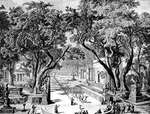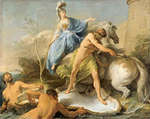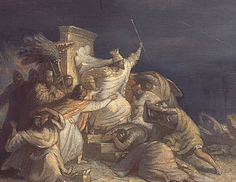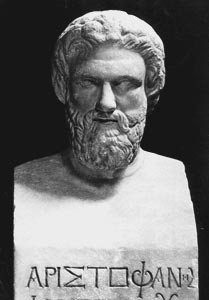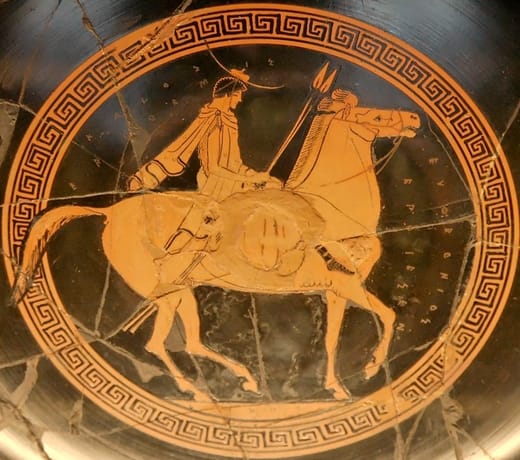
The Knights
The Knights by Aristophanes
The first play Aristophanes produced on his own behalf, The Knights was originally performed at the Lenaea of 424 B.C., where it won the first prize. Hardly a comedy, the play is essentially a violent attack on Cleon, an Athenian general who had, two years earlier, accused Aristophanes before the Athenian Council of having ridiculed the institutions of his city in the presence of foreigners (in his lost play Babylonians). Cleon, however, is mentioned only once by name and is rather transparently represented in the figure of Paphlagon, a newly-bought slave who has taken over the household of his gullible master Demos (“the People”). After being severely beaten by Demos, two of his other slaves—politicians Demosthenes and Nicias—discover a prophecy that Paphlagon can be overthrown, but only by someone who outdoes him in the very qualities that make him a threat. This someone turns out to be a mere sausage-seller. With the help of several knights—one of the richest class in Athens, dubbed that way because they were able to afford a horse—the Sausage-Seller is able to take on Paphlagon in two head-to-head encounters (agons). The second one is held before Demos, who is left to decide which of the two is the better benefactor of the people. The Sausage-Seller emerges as the victor, after he demonstrates that Paphlagon is interested only in himself and not in the needs of the people. Fortunately, it turns out that he is not merely a Sausage-Seller, but a godsend miracle-worker able to rejuvenate Demos to his former self. It is at this point that he reveals his deserving name: Agoracritus, the One chosen (or disputing) at the Assembly.
Date and Historical Background
The Knights (or The Horsemen) was first performed at the Lenaea of 424 B.C., where it won the first prize, defeating Cratinus’ Satyrs and Aristomenes’ Porters. It was the first comedy that Aristophanes produced himself. We know this because at one point in the play, the Chorus explicitly states it, revealing that the author of the comedy has waited so long to produce his plays in his own name because “nothing is more difficult than to cultivate the comic Muse” and because though “many court her, very few secure her favors”—and he finally feels “worthy of them.”
As far as we know—or, at least, as far as Aristophanes tells us in his later plays—The Knights might be the first comedy overtly devoted to attacking a contemporary politician. In this case it is Cleon, an Athenian general then at the height of his power after masterminding Athens to victory against Sparta in the naval battle of Pylos and the land battle of Sphacteria. Unpopular today because of its rich topicality, The Knights was a contemporary triumph and inspired many authors to compose their own “demagogue plays”: in the parabasis of Clouds, Aristophanes even blames one of them (Eupolis) of plagiarism.
Characters and Setting
Characters
• Demos, an elderly Athenian, an allegorical representation of the Athenian People
• Demosthenes, a slave of Demos (a real-life general during the Peloponnesian War)
• Nicias, another slave of Demos (a real-life politician, principal rival of Cleon after Pericles’ death)
• Agoracritus, a sausage seller (his name means “the One chosen by the Agora/Assembly”)
• Paphlagon, both a slave and master of Demos, a thinly veiled version of Cleon
Setting
The play is set outside the house of Demos, near the Pnyx in Athens (the hill where Athenians hosted their assemblies).
Summary of Knights
Prologue
Demosthenes and Nicias, two faithful servants of Demos (who is an allegorical personification of the Athenian people) run onto the stage howling and crying. “Oh! alas! alas! Oh! woe! oh! woe!” cries the former in the opening verses of the play. “Miserable Paphlagonian! may the gods destroy both him and his cursed advice! Since that evil day when this new slave entered the house, he has never ceased belaboring us with blows.” After a few back-and-forths between the two, Demosthenes turns to the spectators and, in a long speech, explains them the problem further.
“We have a very brutal master,” he says, “and most bad-tempered; it's Demos of the Pnyx, an intolerable old man and half deaf. The beginning of last month he bought a slave, a Paphlagonian tanner, an arrant rogue, the incarnation of calumny. This man of leather knows his old master thoroughly; he plays the fawning cur, flatters, cajoles, wheedles, and dupes him at will with little scraps of leavings, which he allows him to get.”
In other words, though a slave, this Paphlagonian (or Paphlagon) is actually a master of Demos. And his former slaves—such as Nicias and Demosthenes—are now at his mercy and can neither help themselves nor Demos. “Who will get us out of this mess?”—Demosthenes asks, only to answer himself in a rather pessimistic tone: “None can escape the Paphlagonian: his eye is everywhere. And what a stride! He has one leg on Pylos and the other in the Assembly.”
By this time, the spectators can already recognize the identity of Paphlagon: it is Cleon, a powerful general, who (in Aristophanes’ opinion) has gotten hold of the senile and gullible Athenian population (Demos) and uses his position to amass wealth and pounce on those more deserving of him to lead Athens into a better future.
Hopeless and helpless, Demosthenes and Nicias steal some wine from Demos’ house to allay their anxiety. Intoxicated, they afterward gain courage to steal something much more important: a set of oracles that Paphlagon refuses to let anyone see. These reveal a dreadful prophecy: Paphlagon will rule “until a filthier scoundrel than he arises”—a sausage-seller.
No sooner is the prophecy disclosed than just such a sausage-seller appears at the end of the street. He is astonished to hear of his prophesized destiny: to become the savior of Athens. “But I have not had the least education,” he replies. “I can only read, and that very badly... I do not at all understand how I can be capable of governing the people.” Of course, these seem to be the very traits necessary for one to become a politician and a ruler of the people (not only in Ancient Athens, it seems, but today as well). As Demosthenes and Nicias try to convince the Sausage-Seller to accept his call, the suspicious Paphlagon awakes and emerges from the house of Demos; his appearance scares the Sausage-Seller into retreat. This inspires Demosthenes to summon the Knights of Athens to his rescue.
Parodos (Entrance Song)
Almost immediately—probably mounted on their horses—a Chorus of Knights (one of the richest classes in Ancient Athens) appear on the stage. It’s instantly evident that they hate Paphlagon as much as Demos’ other slaves: “Strike, strike the villain,” they sing, “who has spread confusion amongst the ranks of the Knights, this public robber, this yawning gulf of plunder, this devouring Charybdis, this villain, this villain, this villain! I cannot say the word too often, for he is a villain a thousand times a day.”
First agon
This venomous attack by the Knights on Paphlagon rallies the Sausage-Seller and a screaming match between the two begins. Literally: each line is more insulting and raucous than the previous one, and each one is told in louder tone. The verbal fight culminates in a fight with sausages and the decision of both combatants to “rush into the Senate” (the Athenian Boule) and let its members decide who is right and who is wrong—or, rather, who of the two is the one with greater demagogic talents. “I will bring four suits against you, each of one hundred talents,” threatens Paphlagon. “And I twenty against you for shirking duty and more than a thousand for robbery,” replies the Sausage-Seller. “Neither gold nor silver nor prayers nor anything else shall impede my denouncing your trickery to the Athenians.” As the two leave, the Knights are left alone on the stage and are free to deliver the parabasis.
Parabasis
In the parabasis (the “stepping forth” of the Chorus), the Knights invite us to consider the genius of Aristophanes, the author of the comedy. They inform us that he has written many comedies before, but that this is the first play he has produced under his own name: he wanted to perfect his art first so as to be worthy of the favor of the Muses. “If you approve this wise caution and his resolve that he would not bore you with foolish nonsense,” they say, “then raise loud waves of applause in his favor this day, so that, at this Lenaean feast, the breath of your favor may swell the sails of his triumphant galley and the poet may withdraw proud of his success, with head erect and his face beaming with delight.” Then they turn to celebrating Poseidon, the god of horses, and they end their speech with a praise of the horses themselves—mostly for performing heroically in a recent assault on Corinth. Of course, this is a sort of indirect self-praise: by lauding the valor of their steeds, the Knights are actually lauding themselves in discreet fashion.
They also celebrate the glory and courage of earlier Athenian generations, the ones that made Athens great and are no more. “Let us sing the glory of our forefathers,” they exclaim. “Ever victors, both on land and sea, they merit that Athens, rendered famous by these, her worthy sons, should write their deeds upon the sacred garment. As soon as they saw the enemy, they at once sprang at him without ever counting his strength. Should one of them fall in the conflict he would shake off the dust, deny his mishap and begin the struggle anew.” The Knights consider themselves descendants of these heroes—as opposed to Paphlagon and those like him who mar their memory with manipulative speeches and all sorts of machinations.
Second agon
At the conclusion of the parabasis, the Sausage-Seller returns from the Senate and announces to the Knights his victory over Paphlagon. Offering meals at the state’s expense, he has outbid his rival and won the support of the delegates. As soon as he is done with his story, Paphlagon comes back as well, evidently furious at the outcome of the Senate battle but also still unwilling to admit that the Sausage-Seller is better than him in everything (or, rather, worse). “I am going to destroy you, or my name is lost,” he cries out, and pleads his rival for a rematch—this time before Demos. The Sausage-Seller willingly obliges, and Demos is summoned from his home to be the judge of a second contest between the two.
This one is even stranger than the first one. It begins allegorically: both Paphlagon and the Sausage-Seller flatter Demos in an attempt to win his affection. “You love me passionately,” says Paphlagon. “I have loved you for many years,” retorts the Sausage-Seller, “but this rascal here has prevented us from being together.” At this point, the Sausage-Seller hints at the possibility that his attempts to outdo Paphlagon in his wickedness may be just a ploy. “Demos,” he says, “you resemble those young men who do not know where to choose their lovers; you repulse honest folks; to earn your favors, one has to be a lamp-seller, a cobbler, a tanner or a currier... If these are the ones you love, I will thieve the bread of others to serve up to you.”
From then on, the debate becomes a more serious one. The Sausage-Seller blames his rival of being indifferent to the war-time pains and griefs of ordinary people, and that he is prolonging the war simply because he is a general and can earn more money that way. In reply to this, Paphlagon compares himself to Themistocles (the Athenian general who saved Greece from Persian invasion) and says that Athens owes almost everything to him. The comparison enrages not only the Sausage-Seller, but also Demos himself: “Silence! stop your abuse! All too long have I been your dupe…”
After this, the debate suddenly turns both ridiculous and vulgar. The Sausage-Seller accuses Paphlagon of starting a campaign against homosexuality in order to stifle the opposition, and blames him for bringing down the price of silphium—a plant that was widely used in Ancient Greece to treat indigestion—so that all might eat it and the jurymen of the court suffocate each other with their flatulence. The implication is that this way there would be no one to judge Paphlagon after the end of the Peloponnesian war as a war criminal.
Somehow, these two insults strike some chord in Demos and he seems largely converted and out of Paphlagon’s sphere of influence. In a desperate attempt to win him over yet again, Paphlagon proposes two further contests. The first one consists of the reading of oracles predicting Demos’ best slave: no matter how much Paphlagon tries to make these prophecies flattering to him and Demos, the Sausage-Seller excels at reinterpreting them in his favor. The second contest is a race, whose object is to decide who of the two rivals can serve Demos’ numerous needs faster. The Sausage-Seller wins again, so Paphlagon resorts to one final self-annihilating gesture of defiance: the reading of the oracles prophesizing his successor. It seems that the Sausage-Seller matches the descriptions perfectly: he is far worse than Paphlagon in anything he has ever specialized to be bad in.
“Alas!” shouts Paphlagon, accepting his fate. “I see the prophecy of the god is verily come true. Alas! roll me home. I am a miserable ruined man…” The Sausage-Seller thanks Zeus for the victory, but the Knights scold him for forgetting their help and ask to be appointed secretaries of the law-court. Demos asks the Sausage-Seller for his name and we learn that it is Agoracritus, “because [he has] always lived on the agora in the midst of lawsuits.” Promising to take care of Demos to the best of his power, Adoratrices takes him back to his house.
Second parabasis
Once again left alone, the Chorus of Knights delivers a sort of second parabasis, a passage—as described by one translator—“filled with singular obscenity and personal vituperation.” Believing that “an insult directed at the wicked should not to be censured,” the Knights hurl a few vile offenses at some people partly forgotten by history, and are, fortunately, interrupted by the return of Agoracritus.
Exodos (Exit Song)
Agoracritus asks for silence to announce his triumph: “I have freshened Demos up somewhat… and have turned his ugliness into beauty. He has once more become as he was in the days of old.” And indeed, Demos comes out of his house rejuvenated and splendid, “perfumed with myrrh, and spreading around him not the odor of lawsuits, but that of peace.” Moreover, he is happy. “You will deem yourself even happier,” says Agoracritus, “when I have handed you the truce of thirty years.”
Suddenly, a beautiful young girl, magnificently attired, appears before the house. We learn that the girl’s name is Truce and that she had been kept locked up in the house by Paphlagon. She is now finally free and can bring prosperity and comfort to all citizens of Athens. “As for Paphlagon,” Demos asks Agoracritus, “what kind of punishment will you inflict upon him?” “It will not be over-terrible,” replies the Sausage-Seller. “I condemn him to follow my old trade.” Demons announces a time of peace and joy and, with the exception of Paphlagon, everybody heads to the town hall for a banquet.
A Brief Analysis
Aristophanes had written three plays before The Knights, but he produced none of them under his own name. Probably encouraged after the success of The Acharnians—and, moreover, enraged after Cleon brought him to court because of The Babylonians—he chose to produce The Knights on his own behalf. The play didn’t only win the first prize at the Lenaea of 424 B.C., but it also won the comedian a host of admirers and imitators: The Knights is probably the first example of a popular subgenre called the “demagogue comedy”—an entire play devoted to the attack of one popular politician.
In this case, the politician in question is Cleon, who is, nevertheless, mentioned only once by name in the entire play, in a little choral song near the end: “Oh! happy day for us and for our children if Cleon perish.” Otherwise, he is epitomized in Paphlagon, a name that might suggest both Paphlagonia (a region from which Athens drew some slaves) and also the verb “paphlazein” (“to splutter”—which is, supposedly, how Cleon talked). Both Nicias and Demosthenes were not named in the original production as well, but even ancient manuscripts catalogue Demos’ two slaves under these names in the character lists. There is little doubt today that this reflects Aristophanes’ intentions: highly topical, The Knights was immensely popular in Ancient Athens not only because of its boldness, but also because it allowed the viewers to constantly make parallels between the plot of the play and the real world around them. For this same reason, The Knights is today often considered one of the poorest of Aristophanes’ comedies. Similarly, Orwell’s Animal Farm would probably mean little to people unaware of the parallels between the animals and the Soviet leaders; to those aware of them, it might seem as the best political satire/allegory ever written. However, even the latter would change as time passes and the Soviet Union becomes less and less relevant to the ways we live our lives.
Unsurprisingly, according to one of the play’s modern editors (Eugene O’Neill Jr.), The Knights is “a greater tribute to its author's courage and sincerity than to his art and taste.” Indeed, the comedy is today studied mostly as a historical and biographical document. Its artistic merits are often questioned, and it’s difficult to explain the unexpected transformation of the Sausage-Seller at the end of the play in terms of the previously proclaimed prophecy. The change can be illuminated much better in relation to Aristophanes’ dreams and wishes—but the structure of a play should not be directed by them, but by genre conventions and internal logic.
The Knights Sources
There are a few translations of The Knights available online, both in verse and in prose; if you are a fan of the latter, you can read a modernized version of an anonymous translation for the Athenian Society here. If, however, you prefer poetry, feel free to delve into John Hookham Frere’s verse adaptation here.
See Also: Aristophanes, Athens, Sparta, Persians
The Knights Video
The Knights Associations
Link/Cite The Knights Page
Written by: The Editors of GreekMythology.com. GreekMythology.com editors write, review and revise subject areas in which they have extensive knowledge based on their working experience or advanced studies.
For MLA style citation use: GreekMythology.com, The Editors of Website. "The Knights". GreekMythology.com Website, 03 Sep. 2020, https://www.greekmythology.com/Plays/Aristophanes/The_Knights/the_knights.html. Accessed 26 April 2024.

